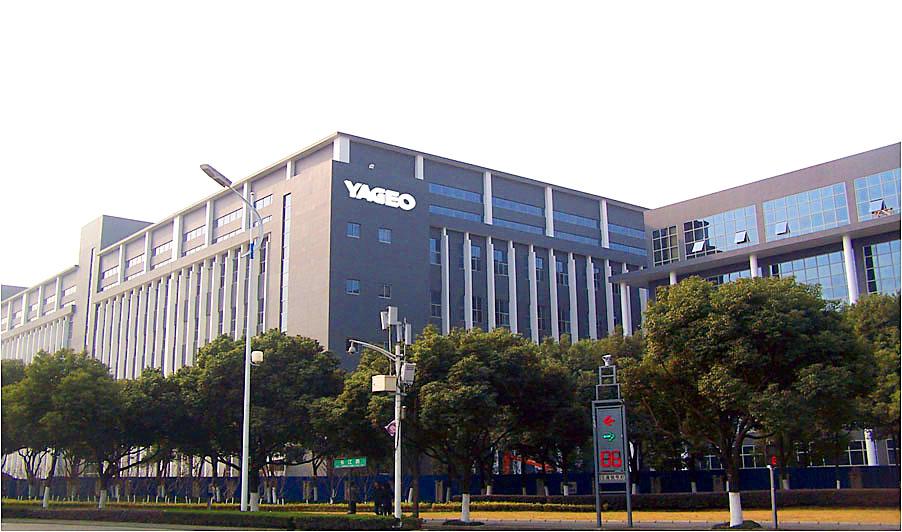Yageo Corp (國巨) on Thursday proposed lowering its paid-in capital by 20 percent as part of its financial restructuring plan.
The world’s third-largest multi-layer ceramic capacitor supplier proposed at a board meeting to reduce its capital by NT$1.08 billion (US$38.08 million) to NT$4.32 billion, joining a growing list of technology companies that have sought to lower capital and boost earnings per share.
The company said it would distribute NT$2 in cash for every share to complete the capital reduction.

Photo: Chang Hui-wen, Taipei Times
Additionally, Yageo proposed a cash dividend of NT$10 per share based on last year’s earnings per share of NT$46.46.
Overall, shareholders would receive NT$12 per share if the dividend payout and capital reduction proposals are approved at the company’s annual general meeting on June 8.
It would be the fifth capital reduction Yageo has undertaken since 2013. As of 2017, Yageo’s paid-in capital had been reduced through four capital reductions from NT$22.1 billion in 2013 to NT$3.5 billion.
The company’s capital increased after 2017 to NT$5.4 billion through acquisitions and mergers, such as the purchase of US-based Pulse Electronics Corp in 2018 for NT$22 billion, before acquiring another US rival, Kemet Corp, for US$1.64 billion in 2020.
The latest capital reduction is expected to boost Yageo’s earnings per share to NT$60 next year, analysts said.
Yageo posted a net profit of NT$22.90 billion for last year, up 90.7 percent from a year earlier, while its consolidated sales hit a new high of NT$106.54 billion, up 57.4 percent from a year earlier.
Gross margin improved by 2.8 percentage points from a year earlier to 40.4 percent.
Yageo said it expects sales for the first quarter of this year to grow between 11 percent and 14 percent from NT$25.69 billion a quarter earlier on the back of an increase in shipments of high-end passive electronics components.
Its business could be affected by the military conflict between Russia and Ukraine, although it does not import any raw materials from either country, the company said.

UNCERTAINTY: Innolux activated a stringent supply chain management mechanism, as it did during the COVID-19 pandemic, to ensure optimal inventory levels for customers Flat-panel display makers AUO Corp (友達) and Innolux Corp (群創) yesterday said that about 12 to 20 percent of their display business is at risk of potential US tariffs and that they would relocate production or shipment destinations to mitigate the levies’ effects. US tariffs would have a direct impact of US$200 million on AUO’s revenue, company chairman Paul Peng (彭雙浪) told reporters on the sidelines of the Touch Taiwan trade show in Taipei yesterday. That would make up about 12 percent of the company’s overall revenue. To cope with the tariff uncertainty, AUO plans to allocate its production to manufacturing facilities in

Taiwan will prioritize the development of silicon photonics by taking advantage of its strength in the semiconductor industry to build another shield to protect the local economy, National Development Council (NDC) Minister Paul Liu (劉鏡清) said yesterday. Speaking at a meeting of the legislature’s Economics Committee, Liu said Taiwan already has the artificial intelligence (AI) industry as a shield, after the semiconductor industry, to safeguard the country, and is looking at new unique fields to build more economic shields. While Taiwan will further strengthen its existing shields, over the longer term, the country is determined to focus on such potential segments as

COLLABORATION: Given Taiwan’s key position in global supply chains, the US firm is discussing strategies with local partners and clients to deal with global uncertainties Advanced Micro Devices Inc (AMD) yesterday said it is meeting with local ecosystem partners, including Taiwan Semiconductor Manufacturing Co (TSMC, 台積電), to discuss strategies, including long-term manufacturing, to navigate uncertainties such as US tariffs, as Taiwan occupies an important position in global supply chains. AMD chief executive officer Lisa Su (蘇姿丰) told reporters that Taiwan is an important part of the chip designer’s ecosystem and she is discussing with partners and customers in Taiwan to forge strong collaborations on different areas during this critical period. AMD has just become the first artificial-intelligence (AI) server chip customer of TSMC to utilize its advanced

While China’s leaders use their economic and political might to fight US President Donald Trump’s trade war “to the end,” its army of social media soldiers are embarking on a more humorous campaign online. Trump’s tariff blitz has seen Washington and Beijing impose eye-watering duties on imports from the other, fanning a standoff between the economic superpowers that has sparked global recession fears and sent markets into a tailspin. Trump says his policy is a response to years of being “ripped off” by other countries and aims to bring manufacturing to the US, forcing companies to employ US workers. However, China’s online warriors